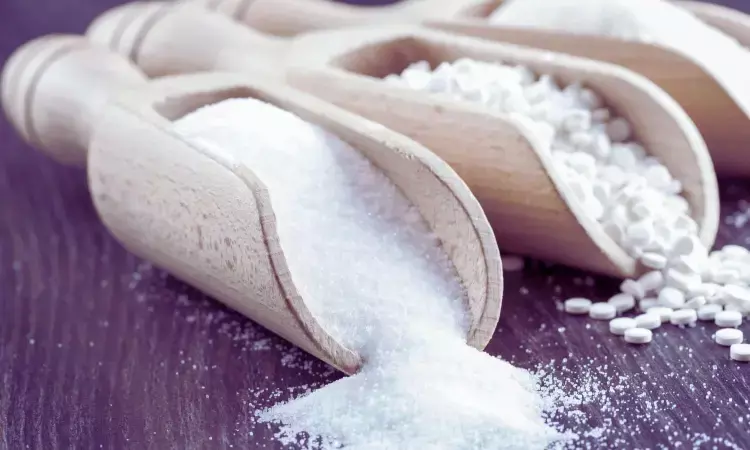- Home
- Medical news & Guidelines
- Anesthesiology
- Cardiology and CTVS
- Critical Care
- Dentistry
- Dermatology
- Diabetes and Endocrinology
- ENT
- Gastroenterology
- Medicine
- Nephrology
- Neurology
- Obstretics-Gynaecology
- Oncology
- Ophthalmology
- Orthopaedics
- Pediatrics-Neonatology
- Psychiatry
- Pulmonology
- Radiology
- Surgery
- Urology
- Laboratory Medicine
- Diet
- Nursing
- Paramedical
- Physiotherapy
- Health news
- Fact Check
- Bone Health Fact Check
- Brain Health Fact Check
- Cancer Related Fact Check
- Child Care Fact Check
- Dental and oral health fact check
- Diabetes and metabolic health fact check
- Diet and Nutrition Fact Check
- Eye and ENT Care Fact Check
- Fitness fact check
- Gut health fact check
- Heart health fact check
- Kidney health fact check
- Medical education fact check
- Men's health fact check
- Respiratory fact check
- Skin and hair care fact check
- Vaccine and Immunization fact check
- Women's health fact check
- AYUSH
- State News
- Andaman and Nicobar Islands
- Andhra Pradesh
- Arunachal Pradesh
- Assam
- Bihar
- Chandigarh
- Chattisgarh
- Dadra and Nagar Haveli
- Daman and Diu
- Delhi
- Goa
- Gujarat
- Haryana
- Himachal Pradesh
- Jammu & Kashmir
- Jharkhand
- Karnataka
- Kerala
- Ladakh
- Lakshadweep
- Madhya Pradesh
- Maharashtra
- Manipur
- Meghalaya
- Mizoram
- Nagaland
- Odisha
- Puducherry
- Punjab
- Rajasthan
- Sikkim
- Tamil Nadu
- Telangana
- Tripura
- Uttar Pradesh
- Uttrakhand
- West Bengal
- Medical Education
- Industry
Aspartame as Sugar Substitute Supports Better Oral Health: Study Finds

USA: A recent systematic review and meta-analysis published in the Journal of Dentistry has revealed that replacing sugar with aspartame helps maintain a healthier oral pH, reduces the development of dental caries in animals, and decreases oral acid production and dental erosion in lab tests compared to sugar.
The study sheds light on the non-cariogenic properties of aspartame, offering promising insights into its role as a safer alternative to sugar in protecting oral health. Stephen A. Fleming, Traverse Science, Inc., Mundelein, IL, 60060 USA, and colleagues aimed to assess whether aspartame contributes to tooth decay and explore the underlying mechanisms influencing its effects on oral health.
Researchers conducted a comprehensive review of literature across major scientific databases—PubMed, Scopus, Web of Science, and CENTRAL—up to February 16, 2024. The analysis included studies comparing aspartame with sucrose or other controls in human and animal models, as well as, in laboratory-based dental samples. The evaluation focused on parameters such as caries development, acid production in the mouth, changes in oral bacterial composition, and effects on dental mineralization. The strength of evidence was assessed using the GRADE framework.
The findings were from thirteen studies, including two clinical trials, seven preclinical trials in rats, and four studies using bovine tooth samples.
The key findings were as follows:
- In human studies, aspartame was significantly less acidogenic than sugar and showed effects similar to water, which is considered neutral for oral health.
- Laboratory-based studies on tooth samples revealed that aspartame exposure led to lower acid production and less dental erosion than sugar.
- Animal studies demonstrated that rats fed aspartame instead of sugar developed fewer cavities.
- The reduction in tooth decay was more pronounced when aspartame replaced sugar entirely, but less when used alongside sucrose.
- There was a modest reduction in sulcal caries with aspartame use.
- While aspartame did not strongly prevent cavities, it showed clear advantages over sugar in reducing cariogenic effects.
The review also examined how aspartame affects oral bacteria, concluding that its influence on microbial composition was limited. This suggests that its benefits in dental health may not stem from altering bacterial activity but rather from its ability to help reduce overall sugar intake, one of the main contributors to tooth decay.
While aspartame appears non-cariogenic, meaning it does not promote cavities, the study found limited evidence to support any significant anti-cariogenic effects—that is, its ability to prevent dental caries through direct biological mechanisms. The primary advantage of aspartame is its potential to replace free sugars in the diet, thereby reducing one of the main risk factors for tooth decay.
The analysis emphasizes that aspartame, when used as a sugar substitute, may help in maintaining oral pH and reducing caries incidence, especially in comparison to sucrose. However, due to variability across studies and the limited strength of evidence, researchers recommend further long-term clinical trials to better understand aspartame’s role in dental health and its potential in caries prevention strategies.
Reference:
Fleming, S. A., Fleming, R. A., & Peregoy, J. (2025). The non-cariogenic effects of aspartame: A systematic review and meta-analysis. Journal of Dentistry, 157, 105715. https://doi.org/10.1016/j.jdent.2025.105715
Dr Kamal Kant Kohli-MBBS, DTCD- a chest specialist with more than 30 years of practice and a flair for writing clinical articles, Dr Kamal Kant Kohli joined Medical Dialogues as a Chief Editor of Medical News. Besides writing articles, as an editor, he proofreads and verifies all the medical content published on Medical Dialogues including those coming from journals, studies,medical conferences,guidelines etc. Email: drkohli@medicaldialogues.in. Contact no. 011-43720751


